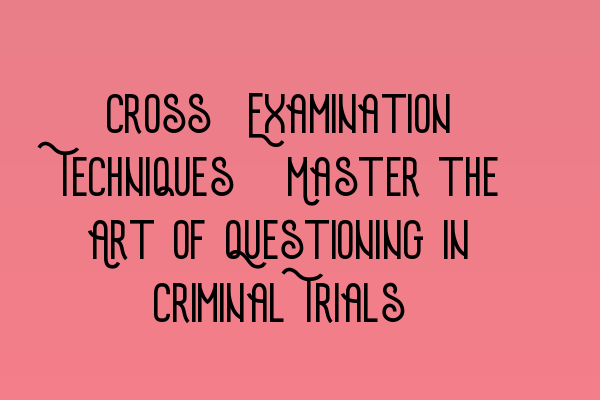Cross-Examination Techniques: Master the Art of Questioning in Criminal Trials
Welcome to the SQE Criminal Law & Practice Law UK blog! In this article, we will delve into the intricate world of cross-examination techniques in criminal trials. Cross-examination is a crucial skill for any criminal law practitioner, and mastering it can make a significant difference in the outcome of a trial. Whether you are an aspiring solicitor preparing for the SRA SQE exams or a seasoned lawyer looking to enhance your questioning techniques, this guide will provide valuable insights.
Understanding the Importance of Cross-Examination
Cross-examination is the process of questioning a witness called by the opposing party. It aims to challenge their credibility, impeach their testimony, and extract favorable information for your client. Effective cross-examination can weaken the prosecution’s case, expose inconsistencies, and create doubt in the minds of the jury. It is a powerful tool to advocate for your client’s innocence or mitigate the severity of their charges.
Mastering Questioning Techniques
To become proficient in cross-examination, it is essential to develop a range of questioning techniques. Here are some strategies that can help elevate your questioning skills to the next level:
- Leading Questions: Leading questions allow you to control the narrative and elicit specific responses from the witness. They often prompt a simple “yes” or “no” answer, enabling you to introduce favorable evidence or expose inconsistencies.
- Open-Ended Questions: Open-ended questions encourage witnesses to provide detailed responses, giving you an opportunity to explore their knowledge, perceptions, and biases. They can be particularly useful when cross-examining expert witnesses.
- Controlled Impeachment: Controlled impeachment involves impeaching a witness using their prior inconsistent statements or contradictory evidence. By strategically introducing inconsistencies, you can undermine the witness’s credibility and portray them as unreliable.
- Repetition: Repetition can be an effective technique to reinforce key points or establish a witness’s inconsistency. By asking the same question in different ways, you can expose any contradictions or flaws in their testimony.
- Establishing Foundation: Before delving into challenging questions, it is crucial to establish the necessary foundation. This involves laying the groundwork by asking background questions that set the stage for subsequent cross-examination.
Preparing for Cross-Examination
Effective cross-examination requires meticulous preparation. Here are some steps you can take to enhance your preparation:
- Thoroughly review the case facts, witness statements, and any available evidence.
- Identify the weaknesses in the opposing party’s case and formulate a strategy to exploit them during cross-examination.
- Create a detailed cross-examination plan, outlining the key points you wish to address and the questions you intend to ask.
- Anticipate potential objections from opposing counsel and prepare persuasive responses to ensure the admissibility of your questions.
- Practice mock cross-examinations to refine your questioning techniques and build confidence.
Conclusion
Cross-examination is a critical skill in criminal trials, and mastering the art of questioning can significantly impact the outcome of a case. By employing various cross-examination techniques and diligently preparing for trial, you can enhance your ability to advocate for your clients and secure favorable results.
For further resources and preparation materials for the SRA SQE exams, check out these related articles:
